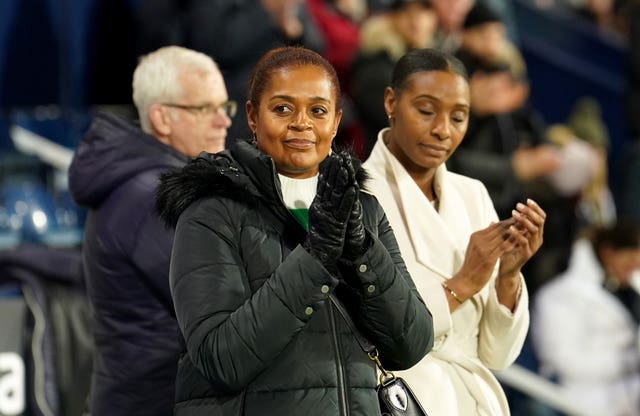Golf has made progress in the drive to end discrimination and improve accessibility to the sport but there is still work to be done, according to England Golf senior independent director Julia Regis.
Having been introduced to golf by her late husband Cyrille – the former West Brom, Coventry, Aston Villa and England striker – following his retirement from playing football, Regis admits she was soon “just as hooked”.
The couple, though, were left perplexed by the entry barriers they found before joining Edgbaston Golf Club, where they were made to feel welcome and supported and where she is still a member to date.
Regis recently took up a position on the board at England Golf, the national governing body for amateur golf, and feels there is “a genuine appetite” to make changes which will evolve and grow the game.
Regis told the PA news agency: “We didn’t find joining a club particularly straightforward, because we kept encountering the reputation of golf ‘oh no, they won’t let you in there’ and ‘maybe you need to look somewhere else’.
“But fortunately we were able to move past some of the things that we heard and we joined Edgbaston Golf Club, which is where I still am as a member, and both became very much involved in the club in terms of competitive golf and being on committees.
“But what I realised very quickly is that there is still a legacy which exists in some areas and at some clubs around the past, around how exclusive golf used to be and how golf clubs used to be intentional about who they would let in and who they wouldn’t.”

Regis added: “At Edgbaston, there is a really strong women’s section, they were very embracing and supportive, but on an individual level, I was almost always very much aware that there were not any other women who looked like me.
“Women with my background, from an African-Caribbean perspective, I am still the only one (member at the club) and so, living in multicultural Birmingham, one of the most diverse cities in England, there is still a lot of work to be done.”
England Golf’s ‘Respect in Golf’ movement helps create greater understanding and embracement of equality, diversity and inclusion within the sport.
The organisation’s ‘Your Voice Matters’ campaign is calling on all players to help end discrimination in a golf setting.
A survey commissioned by England Golf of more than 22,000 golfers nationally found 31 per cent of respondents had experienced or witnessed discrimination at some point in their time within golf – with only 29 per cent confirming they had reported it.
“We need to definitely improve on that,” Regis said.
“We need to create a culture whereby people feel that they can report whatever incident they have accounted and that they will also be listened to and get the support.
“Also that the individuals or clubs or counties will be held accountable to ensure that they investigate the matter and that there is also a suitable conclusion in line with our policies as England Golf.”
More than 50 counties and 650 clubs have already completed the process to attain the ‘Respect in Golf’ status, with an additional 755 clubs actively working towards becoming part of the movement.
“I was at Walmley Golf Club recently for the launch of their all-weather short game area, which means that people with disabilities can come and practice,” Regis said.
“If they are a person who uses a wheelchair, they are no longer excluded, they can go and practice their golf at that facility, which is supported by England Golf.
“We are connecting with the clubs that want to do the work, supporting them, signposting, providing the infrastructure, the support that they need if they genuinely want to do the work to be more accessible and be more welcoming to everyone.”

